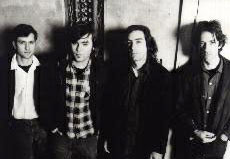|
1997 
Interview with Jay Farrar of Son Volt
During Son Volt's soundcheck on the Atlanta stop of their tour for the new album, Straightaways. I nervously kept going over the questions in my head. Jay Farrar, the band's writer and driving force, has a reputation for being a difficult interview. Even Son Volt's publicist warned me of the job ahead. In a couple of recent interviews, Farrar projects an indifferent, even condescending attitude towards almost every question posed to him. Then it him me-every single article I've read hits him with a multitude of comparisons and questions about his old band, Uncle Tupelo. No wonder he comes off with a so-called "attitude". Uncle Tupelo is hyped as creating "Alt-Country," although the credit really belongs to Gram Parson's International Submarine Band (his precursor to the Flying Burrito Brothers) back in 1968. During soundcheck, Son Volt breaks into an obscure Kink's B-side, "This is Where I Belong." I breathe a sigh of relief as I've found a way to kick off the interview without using the dreaded Uncle Tupelo questions. I wouldn't have thought that Farrar was a Kinks fan. When I asked him about the Kinks song, he deadpanned, "We're still working out the kinks. It's probably one of the first ten records I ever bought, probably the first one was the Beatles, the second one the Rolling Stones and the Kinks were probably just about third." Curious about his self-description of Son Volt, I mention the term "cosmic American music, "Gram Parson's self-description of his own blend of rock and country music. "I've never really sat around and tried to think of a way to categorize it. I can only explain it from a perspective of what influences went into making it. I just think of it more in terms of acoustic based music and electric. I mean, I really wouldn't want to spend too much time doing one of the other without the other." As Gram Parsons was a pioneer in bringing country sounds into rock music, I wondered if Son Volt's approach was the same as the Flying Burrito Brothers. Farrar thinks a moment, "yeah, that term could be applied to him, I don't think it could be us. I mean the Gilded Palace of Sin was a real pivotal album when I first heard it." When comparing Son Volt to some of the current country music out now, their music seems truer to the quintessential "bare-your-soul" country approach. I asked Jay what he thought about all the flash and hype in today's country music. "It's fairly insidious", he swipes. I wondered, which would apply to Son Volt - a rock band with country sounds or a country band that sounds rock. Jay clarifies, "it's a rock band, but those songs with the instrumentation of country music." But what does he really think of the tag, Alternative-Country? Is the description really just bullshit? "It's their prerogative, I guess, to call it whatever they want, but I don't necessarily believe in that term." Growing up in Belleville, Illinois, I wouldn't have imagined that Jay Farrar would be exposed to much country music. Most northerners that I know avoid country music like the plague. As I point out this observation, Jay responds, "it depends on where you're at I guess. Some of the old country performers were from the north. I grew up in an environment where there was a lot of country and folk music around. More or less the Beatles and the Rolling Stones and the '70s rock music on the radio was inspirational as well. My parents were from Springfield, Missouri, which is in the southern part of the state. Both my parents played guitar and sang. My dad would play Hank Williams songs, or Jimmy Rogers songs. And my mom had a pretty good record collection, so I was exposed to Woody Guthrie, Leadbelly and stuff like that at an early age." Are there any albums that he never gets tired of playing? Jay acknowledges, "certainly Hank Williams, I never get tired of listening to old Hank Williams." Having been in bands since high school, where he met Jeff Tweedy, Jay has been writing songs over ten years. How does he describe the changes in his writing over the years? "I think its pretty unavoidable that its gonna change, you know, in what way I'm not sure. Your sensibility changes over time. Sometimes it can reflect whatever I happen to be listening to at the time. I guess an example of that would be just take Skip James or some other blues performer, where they're playing using a different tuning on guitar and maybe I'll write a song based on that tuning, a tuning that I didn't know years ago, in that respect." I was curious if touring seemed to inspire songs, or is it more of a hindrance to his songwriting? "Ah, it's both generally, there's not enough time. Too many distractions to actually finish anything. But I'm sure for other people it's different. You gather ideas from the road anyway." I asked if his songs were mainly observations, or is there any implied preaching or messages? "Yeah, it's more from an observer's perspective as opposed to, you know, preaching, if it ever happens at all."
I can't help but think of the lyrics to "Last Minute Shakedown". They seem to sum up Jay's philosophy, both in regards to his writing style and maybe even to the breakup of his old group: "pieces break apart, re-arrange and make focus clear/out of chaos comes order and back again/the truth is plain, but not seen."
|